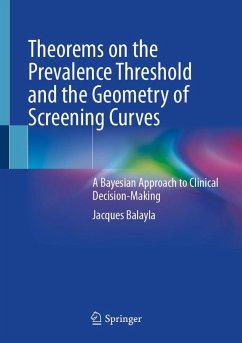In
Theorems on the Prevalence Threshold and the Geometry of Screening Curves, the author explores the mathematical underpinnings of screening and diagnostic testing, offering a unique and novel perspective which employs classical differential geometry and Bayesian theory to elucidate critical aspects of clinical decision-making. Taking the reader on a mathematical journey which bridges these seemingly unrelated worlds, the author presents a quantifiable framework on clinical judgement by introducing the "prevalence threshold" - a novel statistical parameter derived from Bayesian principles by means of the study of the geometry of screening curves. As the prevalence threshold demarcates the pretest probability level beyond which additional information ceases to significantly enhance the yield and reliability of a clinical assessment, it may serve as a benchmark for confidence in clinical decision-making. Given the theorems herein described, readers will find comprehensive analyses and insightful explorations of how these geometric concepts apply to real-world diagnostic scenarios, allowing the clinician to navigate clinical care more effectively at both the individual and public health levels.
Dieser Download kann aus rechtlichen Gründen nur mit Rechnungsadresse in A, B, BG, CY, CZ, D, DK, EW, E, FIN, F, GR, HR, H, IRL, I, LT, L, LR, M, NL, PL, P, R, S, SLO, SK ausgeliefert werden.









